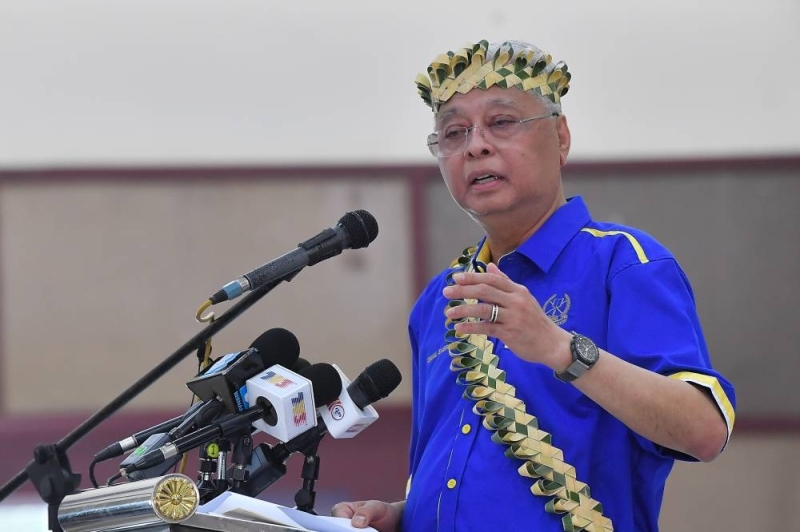Ex-Bar chiefs call for full details of mandatory death penalty repeal, formalised by tabling of Bill

Datuk Ambiga Sreenevasan, in welcoming the move to abolish the mandatory death penalty, said ‘the devil is in the details’. — File picture by Ham Abu Bakar
By R. Loheswar
Saturday, 11 Jun 2022
KUALA LUMPUR, June 11 — Lauding the government’s move to abolish the mandatory death penalty, two ex-Bar Council presidents said they want to see the details of the proposed amendments and hope the Bill to amend related laws are presented in Parliament with full transparency.
Datuk Ambiga Sreenevasan and Ragunath Kesavan said yesterday's announcement was an important first step. but it does not mean the death penalty has been abolished totally and they would like to see what amendments were proposed in detail in Parliament.
Ragunath Kesavan described as 'excellent', the move to abolish the mandatory death penalty. — File picture by Ham Abu Bakar
"The ideal position is to abolish the death penalty altogether but this is an important first step,” Ambiga told Malay Mail.
"Of course, the devil is in the details and I would like to see the actual bills and to see the actual amendments."
Ragunath when contacted was ecstatic at the news and said he is optimistic that the laws would be passed given the government's commitment to it.
"Excellent move. A huge step forward for a more humane criminal justice system in Malaysia. It puts back the discretion in the judiciary to decide on the punishment.
"The other proposed reforms are very progressive and welcomed. This is the commitment given by the government. A clear indication of intent and willingness to commit to reforms,” he said.
For years local NGOs and human rights groups have called for the mandatory death penalty to be abolished as there have been countless drug mules and innocent people duped into trafficking drugs.
They have no choice but to face the gallows once sentenced and many of the accused families did not know how to get clemency.
In August 2019, the Pakatan Harapan (PH) administration formed the Special Committee to Review Alternative Punishments to the Mandatory Death Penalty to examine alternatives to the mandatory death sentence.
The PH government collapsed in February 2020, however, before the Bill for the abolition of the death penalty could be tabled in the March meeting of Parliament that year.
At the time, de facto law minister Datuk Seri Wan Junaidi Tuanku Jaafar said that before the government decides on any amendments, it needed to determine the effectiveness of capital punishment as a deterrent to crime while also looking at alternative punishments.
Yesterday, Wan Junaidi announced that the government has agreed to abolish the mandatory death penalty and substitute sentence at the discretion of the court.
In explaining the move to abolish the mandatory death penalty Wan Junaidi said they needed to ensure the relevant laws took into account the principles of proportionality and constitutionality in terms of the crime committed.
Goh Cia Yee, a criminal lawyer with the Young Lawyers Movement also welcomed the move adding that sentencing guidelines should be offence specific and must be subject to review.
"The discretion should not be limited by a set of circumstances as in the current 39B provision. The court should be allowed to exercise its discretion fully with the guidance of common law in choosing the appropriate sentence,” Goh told Malay Mail.
"Rather than stating the circumstances in the provision itself, a better approach would be to have sentencing guidelines that may suggest factors to consider in the determination of whether the death sentence should be met or not.
"The sentencing guideline should be offence specific and subject to proper review from time to time by the sentencing council,” he said.
Lawyer and The Malaysian United Democratic Alliance (Muda) vice-president Lim Wei Jiet said the move was a long time coming and will distance the country from the status quo of sentencing someone to death automatically for drug offences whether they deserve it or not — which he said is a thing of the past.
"Moving forward I hope the prime minister will immediately table the amendments to all legislations relevant to this matter to make sure this mandatory death penalty is taken out from out books.
"The next thing we need is a moratorium on all executions for those convicted under the death penalty pending these amendments,” Lim said when contacted.
Following Wan Junaidi's announcement, Prime Minister Datuk Seri Ismail Sabri Yaakob explained that the death penalty will remain and not be abolished, and the change is only on the fact that judges are now given discretion in sentencing.
Wan Junaidi had said the Cabinet had also agreed for a further study to be carried out on the proposed substitute sentences for 11 offences carrying the mandatory death penalty, one of which is under Section 39B of the Dangerous Drugs Act 1952.
He also said the government has yet to set a timeframe for the abolition of the mandatory death penalty to take effect with many areas needing refining, including the proposal to set up a tribunal to study cases already served with the mandatory death sentence.
After announcement of repeal, PM says death penalty still remains but judges given discretion in sentencing

Prime Minister Datuk Seri Ismail Sabri Yaakob speaks during the Peninsular Malaysia Orang Asli Association’s (POASM) annual general meeting in Bera June 10, 2022. — Bernama pic
Friday, 10 Jun 2022
BERA, June 10 — Prime Minister Datuk Seri Ismail Sabri Yaakob today explained that the death penalty will remain and not be abolished, and the change is only on the fact that judges are now given discretion in sentencing.
He said this in response to Minister in the Prime Minister’s Department (Parliament and Law) Datuk Seri Wan Junaidi Tuanku Jaafar’s statement earlier that the government had agreed to abolish the mandatory death penalty and to substitute it with other sentences which are subject to the discretion of the court.
Ismail Sabri said with the decision, the “mandatory” part will be removed and judges will no longer be bound by the word (mandatory) which had left them with no choice but to impose the death penalty on criminal offenders as provided by law, such as in drug trafficking cases.
“We are of the view that everyone deserves a second chance. If there are two options (of sentences), and if the offender is found to be a hardcore drug trafficker to the extent of causing hundreds of thousands of people to die (due to drugs), he can be sentenced to death and allowed to be sent to the gallows.
“However, if the judge, in his discretion, felt that the offender should be given a second chance and decided to sentence him to life imprisonment with whipping, he can substitute the mandatory death penalty with that life sentence,” he said.
Ismail Sabri was met after officiating the Peninsular Malaysia Orang Asli Association’s annual general meeting here today.
Ismail Sabri said Section 39B of the Dangerous Drugs Act 1952, for example, provides for a mandatory death penalty upon conviction, which left the judge with no choice but to impose the death penalty even though there may be several factors that can be taken into consideration.
“Sometimes, the case involved an 18-year-old. The judge may find him ‘trapped’ as drugs were found in his bag but he could not prove that they belonged to somebody else, and the court had to send him to the gallows even though the judge felt that the accused was just a young man who should be given a second chance to change.
“We have to understand that the death penalty is not abolished and will remain, it’s just that it will no longer be mandatory,” he said.
Ismail Sabri added that although the government agreed in principle to abolish the implementation of the mandatory death penalty, the matter still needed to be scrutinised. — Bernama

Prime Minister Datuk Seri Ismail Sabri Yaakob speaks during the Peninsular Malaysia Orang Asli Association’s (POASM) annual general meeting in Bera June 10, 2022. — Bernama pic
Friday, 10 Jun 2022
BERA, June 10 — Prime Minister Datuk Seri Ismail Sabri Yaakob today explained that the death penalty will remain and not be abolished, and the change is only on the fact that judges are now given discretion in sentencing.
He said this in response to Minister in the Prime Minister’s Department (Parliament and Law) Datuk Seri Wan Junaidi Tuanku Jaafar’s statement earlier that the government had agreed to abolish the mandatory death penalty and to substitute it with other sentences which are subject to the discretion of the court.
Ismail Sabri said with the decision, the “mandatory” part will be removed and judges will no longer be bound by the word (mandatory) which had left them with no choice but to impose the death penalty on criminal offenders as provided by law, such as in drug trafficking cases.
“We are of the view that everyone deserves a second chance. If there are two options (of sentences), and if the offender is found to be a hardcore drug trafficker to the extent of causing hundreds of thousands of people to die (due to drugs), he can be sentenced to death and allowed to be sent to the gallows.
“However, if the judge, in his discretion, felt that the offender should be given a second chance and decided to sentence him to life imprisonment with whipping, he can substitute the mandatory death penalty with that life sentence,” he said.
Ismail Sabri was met after officiating the Peninsular Malaysia Orang Asli Association’s annual general meeting here today.
Ismail Sabri said Section 39B of the Dangerous Drugs Act 1952, for example, provides for a mandatory death penalty upon conviction, which left the judge with no choice but to impose the death penalty even though there may be several factors that can be taken into consideration.
“Sometimes, the case involved an 18-year-old. The judge may find him ‘trapped’ as drugs were found in his bag but he could not prove that they belonged to somebody else, and the court had to send him to the gallows even though the judge felt that the accused was just a young man who should be given a second chance to change.
“We have to understand that the death penalty is not abolished and will remain, it’s just that it will no longer be mandatory,” he said.
Ismail Sabri added that although the government agreed in principle to abolish the implementation of the mandatory death penalty, the matter still needed to be scrutinised. — Bernama

No comments:
Post a Comment